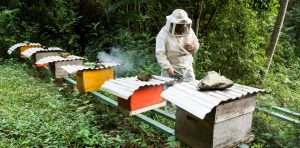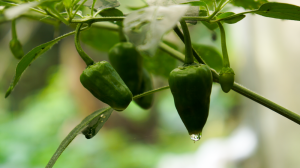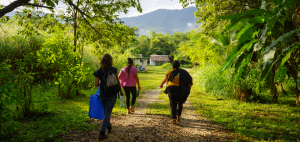One Earth towards sustainability
By: Patricia Olivares.

“In the universe there are billions of galaxies, in our galaxy there are billions of planets, but there is only one Earth”.
One Earth to live on. One Earth to change our lifestyle and save nature. One Earth to acquire sustainable production systems. One Earth to rebuild a world and a society of hope for the present and future generations.
50 years after the slogan used at the 1972 Stockholm Conference: “One Earth” -the event that led to the establishment of World Environment Day– today is taken up again to emphasize the problem we face. For this reason, Amextra joins efforts to work with sustainable and sustainable projects that give a breath of life to the Earth from the Northern Jungle of Chiapas, in the south of Mexico.
 With 11 years of operation and experience, Amextra’s Pej’pem Agroecological Center in Palenque, offers and develops sustainable productive projects, which help to recover the region’s ecosystem, to promote a balance of coexistence between nature and human activities.
With 11 years of operation and experience, Amextra’s Pej’pem Agroecological Center in Palenque, offers and develops sustainable productive projects, which help to recover the region’s ecosystem, to promote a balance of coexistence between nature and human activities.
But it also benefits marginalized families by promoting food sovereignty and providing income-generating alternatives to improve their quality of life and cope with economic crisis, such as agroecological agriculture.
Iván Raúl Salazar Gómez, environmental promoter in Palenque, within the framework of World Environment Day, explains about the two great qualities that Amextra projects must have for their development and continuity, not only at the Agroecology Center, but also in the communities themselves:
“By sustainable we refer to the arguments with we can maintain, appropriate and innovate in the projects making know the benefits to future generations. And, in terms of sustainability we refer to how each project will remain active for a long time without affecting the environment”.
The concept of sustainability has evolved throughout human history, but today it is understood that to achieve sustainability, we must consider the economic, social and environmental factors that must be developed in parallel and in an integrated manner, to satisfy current human needs and those of future generations. In accordance with the equitable, the viable and the bearable.
This principle of sustainability is fundamental, therefore, Ivan comments that in order to take care of the environment, agroecological production techniques must be promoted. Understanding agroecology as a scientific but also social option for the camp, which involves a set of practices based on the diversification of agricultural systems and biodiversit
“Agroecology includes procedures based mainly on promoting biological interactions and synergies beneficial to agricultural systems. It is also a science that seeks to dialogue with the knowledge of rural producers and takes up aspects of ecology, agronomy and other areas. It is also a science that seeks to dialogue with knowledge of rural producers and takes up aspects of ecology, agronomy and other areas. In addition, it is recognized as part of a peasant social movement that vindicates the struggle for Earth, water and territory”, Mariana Benítez Keinrad, researcher at the National Laboratory of Sustainability Sciences (LANCIS) of the Institute of Ecology.
On the other hand, Iván Salazar also considers that the exchange of experiences and support for educational institutions or research centers that seek to share knowledge, that make visible new perspectives on environmental care visible, would give us alternatives to face the challenge of the environmental crisis.
“Supporting training centers such as the Agroecological Center Pej’pem, which seek to strengthen the knowledge of future professionals, whose goal is to care for the environment for the future generations”.
Thus, the Agroecological Center serves as a learning space for students and producers, or the general public, who wish to improve their knowledge or share their experiences in the management of agroecological techniques and ecotechnologies.

“The technologies that make it possible to take advantage of natural resources in a sustainable way, without jeopardizing the environmental future of the planet, and that have been designed and built for the contexts and needs of a community, are called ecotechnologies. And its applications are eco-techniques, which materialize in devices, devices and tangible equipment”, Guillermo Cárdenas.
For this reason, at Amextra there are workshops for the production of vegetables in orchards -under agroecological management- encouraging communities to recover the endemic seed. In addition, the Pej’pem Center has the productive areas of the Mayan orchard, vegetables and agroecological garden that, as a whole, serve as a living seed bank. It also has an area for the production of organic fertilizers, which is promoted as an alternative to the use of agrochemicals; and it has agroforestry systems by succession (food forest), which is a strategy for the recovery of the forest in an induced manner.
 The United Nations (UN) makes a call to opt for the path of sustainability in all aspects of life, and with Amextra’s projects in highly marginalized communities, we know that it is possible.
The United Nations (UN) makes a call to opt for the path of sustainability in all aspects of life, and with Amextra’s projects in highly marginalized communities, we know that it is possible.
It is time to change our consumption habits, as we currently use the equivalent of 1.6 planet Earths to maintain our style. At what cost will we continue to maintain this pace if we have only one Earth?
Ivan Salazar makes a call of conscience, because after his years of experience in the implementation of agroecological techniques and ecotechnologies, he believes that in Mexico:
“There is very little training in the care of the environment and not because there is no means or information, but because sometimes it is easier for us to ignore the current situation. But we must think about the world we are going to leave to young people and children, what do we want for them? An arid world or a place where they can enjoy what we are leaving them today. The change is in us”.
50 years after the slogan “One Earth”, today we continue to join efforts around the world to save it. If you are interested in learning more about the Pej’pem Agroecological Center, click here or contact us to take action to care for the environment.
It’s time to act!

© 2023 Amextra, Asociación Mexicana de Transformación Rural y Urbana A.C. Todos los derechos reservados, México 2017-2023.








Leave a Reply